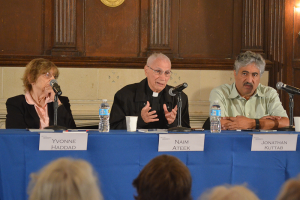
School of Foreign Service Professor Yvonne Haddad, Anglican priest Naim Ateek and human rights lawyer Jonathan Kuttab discussed the problems faced by the Christian minority in Israel and Palestine at a panel discussion Friday in Copley Formal Lounge.
Anglican priest Naim Ateek and Mandela Institute for Palestinian Prisoners co-founder Jonathan Kuttab discussed several issues faced by the Christian minority in Israel and Palestine in a panel discussion in Copley Formal Lounge on Friday.
The event, which was titled “Christians in the Holy Land,” was organized by the Prince Alwaleed bin Talal Center for Muslim-Christian Understanding. Around 10 attendees joined Ateek and Kuttab in the discussion.
Ateek, who is a native of Palestine and a former canon of St. George’s Cathedral in Jerusalem, is the co-founder of the Sabeel Ecumenical Liberation Theology Center, an organization dedicated to overcoming denominational barriers to peace in Israel and Palestine.
Kuttab, who serves on the board of SELTC, is a practicing lawyer in Washington, D.C. and Israel, where he specializes in human rights violations and social justice in Palestine.
According to Ateek, he founded SELTC with the intention of joining Muslims and Christians together through dialogue.
“SELTC took on itself that responsibility of trying to really bring the Muslims and the Christians together,” Ateek said. “This interfaith ministry is trying to bring down any prejudices between our communities, yet there is still so much more to be done.”
As the discussion progressed, Ateek highlighted the achievements of Palestinian Christians in establishing interfaith networks and community-building institutions. He also discussed particular instances in which the Christian minority continues to be victims of racism and violence.
“[The Christian community] has a number of organizations — not only schools, but clinics, hospitals, guest houses — and we make sure there is no discrimination on any basis, including religion,” Ateek said. “Yet Israel is an apartheid state — a racist state — and racism is spiraling. Many of the outside settlers coming into Palestine are burning churches, and there is no action on the part of Israel.”
Over the course of the discussion, audience member Kathy Aquilina, the program director of local nonprofit Initiatives of Change, commented on Ateek’s views of Zionist settlers in Palestine and the violence they influence.
“One of the scourges against Palestinians are some Americans who have become stridently religious settlers who exhibit violence and racism against them,” Aquilina said. “[Palestinians] feel that the United States has continually disappointed them by not standing up for justice in the area.”
Ateek recalled his own experience with early Zionist settlers during the 1948 Arab-Israeli War. The conflict broke out as a result of tension between Zionists and Arabs as a result of the negative feedback to the United Nations Partition Plan for Palestine, which displaced more than 700,000 native Palestinians.
“Israel has never treated Christians in any special way,” Ateek said. “I recall that I was a boy in 1948 when the Zionists came and occupied our town. There were Christians and Muslims living in it, and the Zionists drove us out and we had nothing. To them we were just Palestinians, and they wanted to occupy the land and everything we owned was confiscated. The discrimination going on today has continued and is against Christians and Muslims.”
Kuttab then turned the conversation toward questions on the implementation and practice of international law and human rights as a way to protect the Christian minority.
“The battle for human rights, for international law, for equality before the law, is no longer theoretical and theological and academic,” Kuttab said. “It becomes an issue of practical, daily survival. The reality is that there are laws on the book that lead necessarily to discrimination, to racism, to denial of rights. This is where we must concentrate our efforts.”
Kuttab then mentioned that while there are laws in Israel that protect individuals from racism and discrimination, these laws only apply to Israeli citizens and do not extend to non-Jewish individuals living in the Palestinian territories.
“If a system of law and a legal system grant rights to one particular portion of the population and denies it to a portion of the population on the basis of religion or race or creed, then it has a name. It is called apartheid, and it is evil and improper and worthy of a fight against it,” Kuttab said.
Afterward, the panel opened up the discussion to the audience. Fr. Drew Christiansen, S.J., the co-director of the Program on the Church and the World in the Berkley Center for Religion, Peace and World Affairs, asked both panelists to go into further detail on the space nonviolence plays in pushing for equality and justice among Palestinians.
“I really wanted to know what space there was for nonviolence,” Christiansen said. “The Israelis don’t allow nonviolent demonstrations to occur, so the military action and police action that occur, depending on what side of the green line you’re on, most often prevent there from being any nonviolent resistance. And without that kind of space, you are going to have clashing.”
Kuttab responded to Christiansen’s question by discussing the role nonviolence should play in the activism for justice and equality, while linking the theme of this activism to faith and Christian dogma.
“I think nonviolence is the only effective method and Palestinians have practiced it intermittently with varying results,” Kuttab said. “Nonviolence has to be the only way because violence only breeds more violence. We must find a better way than to out-violence the other side. Nonviolence is the way to go.”




















